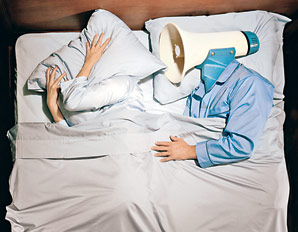 Two new studies have found that people with sleep apnea[1], a common disorder that causes snoring, fatigue and dangerous pauses in breathing at night, have a higher risk of cancer.[2] The new research marks the first time that sleep apnea has been linked to cancer in humans.
Two new studies have found that people with sleep apnea[1], a common disorder that causes snoring, fatigue and dangerous pauses in breathing at night, have a higher risk of cancer.[2] The new research marks the first time that sleep apnea has been linked to cancer in humans.
Dr. Joseph Golish, the former chief of sleep medicine at the Cleveland Clinic, said that the cancer link may not prove to be as strong as the well-documented relationship between sleep apnea and cardiovascular disease, “but until disproven, it would be one more reason to get your apnea treated or to get it diagnosed if you think you might have it.”
Though many cases go undiagnosed, the condition is a top concern because it deprives your body of oxygen at night that usually coincides with cardiovascular disease, obesity and diabetes, and now cancer. According to Dr. Golish, for the first time there appears to be a very solid association.
The researchers found that the more severe a person’s breathing problems at night, the greater the likelihood of dying from cancer. People with moderate apnea were found to die of cancer at a rate double that of people without disordered breathing at night, while those in the severe category died at a rate 4.8 times that of those without the sleep disorder.
Many cases of sleep apnea can be treated with a dental devise that we custom design to your mouth. If you’re a candidate or have an interest in sleep apnea device, please contact our team for a consult.
Novy Scheinfeld, DDS, PC
ZoAnna Bock, MS, DMD
Hanna Orland, DMD
290 Carpenter Drive, 200A
Atlanta, GA 30328
404-256-3620
and
3781 Chamblee Dunwoody Road
Chamblee, GA 30341
770-455-6076
[1] In one of the studies, researchers in Spain followed thousands of patients at sleep clinics and found that those with the most severe forms of sleep apnea had a 65 percent greater risk of developing cancer of any kind. The second study, of about 1,500 government workers in Wisconsin, showed that those with the most breathing abnormalities at night had five times the rate of dying from cancer as people without the sleep disorder.
[2] The studies were observational, and other, unknown factors may account for the correlation between sleep apnea and cancer.
